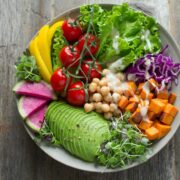Eczema is a common skin condition that causes skin to become inflamed, itchy, and red. Certain foods can worsen these symptoms or trigger flare-ups for some people. Identifying and avoiding these can be key to managing eczema effectively. Here’s a look at eight foods known to potentially exacerbate eczema symptoms.
1. Dairy Products
Products like milk, cheese, and butter contain hormones and proteins such as casein and whey, which can irritate the immune system and inflame eczema in some people. Switching to plant-based alternatives might help alleviate the symptoms.
2. Eggs
Eggs, especially the whites, are a common allergen that can trigger eczema in many individuals. If you suspect eggs might be exacerbating your skin condition, consider eliminating them from your diet for a period to observe any improvements.
3. Soy Products
Soybeans and soy-based products like tofu and soy milk can sometime prompt an eczema flare-up. Similar to dairy and eggs, soy can act as an allergen and should be consumed cautiously by those with sensitive skin.
4. Gluten-Containing Grains
Gluten, a protein found in wheat, barley, and rye, can lead to eczema symptoms if you have a gluten sensitivity. Choosing gluten-free grains like quinoa, rice, or corn may help manage your symptoms better.
5. Nuts
While nuts are nutritious, they are also among the top allergenic foods, potentially leading to severe eczema reactions in those with nut allergies. It’s advisable to identify specific nuts that may cause problems and avoid them.
6. Acidic Fruits
Citrus fruits like oranges, lemons, and grapefruits have high acidity, which can irritate the skin and trigger eczema. If you find these fruits exacerbate your eczema, you might consider cutting them out of your diet.
7. Artificial Additives
Foods containing artificial colorings, preservatives, and flavorings are also potential triggers for eczema flare-ups. These chemicals can disrupt the immune system and aggravate symptoms, so it’s best to consume foods in their most natural state.
8. Spices
Certain spices, such as vanilla, cloves, and cinnamon, are known to cause skin irritation and exacerbate eczema. Use these spices cautiously, especially if you’ve noticed a pattern of irritation after meals containing these ingredients.
Conclusion
Managing eczema can often require dietary adjustments, and identifying your personal triggers is key. It might be helpful to keep a food diary to track what you eat and how it affects your skin condition. As each individual’s response can vary, working with a healthcare provider or a nutritionist can provide personalized advice and support. Remember that avoiding trigger foods is one part of a broader management strategy that includes skincare and lifestyle adjustments.
Disclaimer
The information provided in this article is for educational purposes only and should not be considered medical advice. Always consult with a licensed healthcare provider or dermatologist before making any changes to your diet or eczema treatment plan. The suggestions made may not be suitable for everyone and should be customized to meet individual health needs.



















Comments